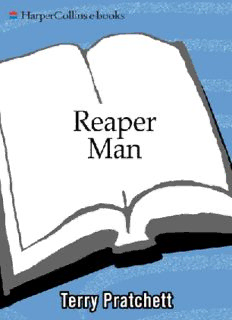
Reaper man (Discworld, #11) PDF
Preview Reaper man (Discworld, #11)
Terry Pratchett A Novel of Discworld® Contents Begin Reading 1 About the Author Praise Other Books by Terry Pratchett Cover Copyright About the Publisher T he Morris dance is common to all inhabited worlds in the multiverse. It is danced under blue skies to celebrate the quickening of the soil and under bare stars because it’s springtime and with any luck the carbon dioxide will unfreeze again. The imperative is felt by deep- sea beings who have never seen the sun and urban humans whose only connection with the cycles of nature is that their Volvo once ran over a sheep. It is danced innocently by raggedy-bearded young mathematicians to an inexpert accordion ren- dering of “Mrs. Widgery’s Lodger” and ruthlessly by such as the Ninja Morris Men of New Ankh, who can do strange and terrible things with a simple handkerchief and a bell. And it is never danced properly. Except on the Discworld, which is flat and sup- ported on the backs of four elephants which travel through space on the shell of Great A’Tuin, the world turtle. And even there, only in one place have they got it right. It’s a small village high in the Ramtop Moun- tains, where the big and simple secret is handed down across the generations. 1 2 TERRY PRATCHETT There, the men dance on the first day of spring, backward and forward, bells tied under their knees, white shirts flapping. People come and watch. There’s an ox roast afterward, and it’s generally con- sidered a nice day out for all the family. But that isn’t the secret. The secret is the other dance. And that won’t happen for a while yet. There is a ticking, such as might be made by a clock. And, indeed, in the sky there is a clock, and the ticking of freshly minted seconds flows out from it. At least, it looks like a clock. But it is in fact exactly the opposite of a clock, and the biggest hand goes around just once. There is a plain under a dim sky. It is covered with gentle rolling curves that might remind you of something else if you saw it from a long way away, and if you did see it from a long way away you’d be very glad that you were, in fact, a long way away. Three gray figures floated just above it. Exactly what they were can’t be described in normal lan- guage. Some people might call them cherubs, al- though there was nothing rosy-cheeked about them. They might be numbered among those who see to it that gravity operates and that time stays separate from space. Call them auditors. Auditors of reality. They were in conversation without speaking. They didn’t need to speak. They just changed reality so that they had spoken. REAPER MAN 3 One said, It has never happened before. Can it be done? One said, It will have to be done. There is a personal- ity. Personalities come to an end. Only forces endure. It said this with a certain satisfaction. One said, Besides... there have been irregulari- ties. Where you get personality, you get irregulari- ties. Well-known fact. One said, He has worked inefficiently? One said, No. We can’t get him there. One said, That is the point. The word is him. Be- coming a personality is inefficient. We don’t want it to spread. Supposing gravity developed a personal- ity? Supposing it decided to like people? One said, Got a crush on them, sort of thing? One said, in a voice that would have been even chillier if it was not already at absolute zero, No. One said, Sorry. Just my little joke. One said, Besides, sometimes he wonders about his job. Such speculation is dangerous. One said, No argument there. One said, Then we are agreed? One, who seemed to have been thinking about something, said, Just one moment. Did you not just use the singular pronoun, “my?” Not developing a personality, are you? One said, guiltily, Who? Us? One said, Where there is personality, there is dis- cord. One said, Yes. Yes. Very true. One said, All right. But watch it in future. 4 TERRY PRATCHETT One said, Then we are agreed? They looked up at the face of Azrael, outlined against the sky. In fact, it was the sky. Azrael nodded, slowly. One said, Very well. Where is this place? One said, It is the Discworld. It rides through space on the back of a giant turtle. One said, Oh, one of that sort. I hate them. One said, You’re doing it again. You said “I.” One said, No! No! I didn’t! I never said “I”! ...oh, bugger... It burst into flame and burned in the same way that a small cloud of vapor burns, quickly and with no residual mess. Almost immediately, another one appeared. It was identical in appearance to its van- ished sibling. One said, Let that be a lesson. To become a per- sonality is to end. And now . . . let us go. Azrael watched them skim away. It is hard to fathom the thoughts of a creature so big that, in real space, his length would be meas- ured only in terms of the speed of light. But he turned his enormous bulk and, with eyes that stars could be lost in, sought among the myriad worlds for a flat one. On the back of a turtle. The Discworld—world and mirror of worlds. It sounded interesting. And, in his prison of a bil- lion years, Azrael was bored. And this is the room where the future pours into the past via the pinch of the now.
Description: